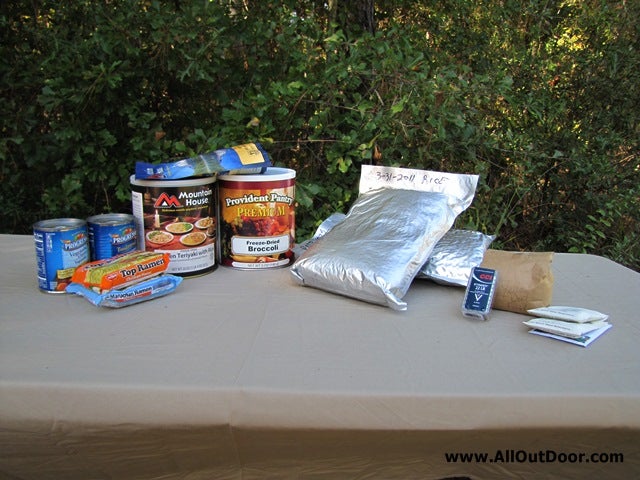Building a Well-Rounded Long Term Food Stockpile
Kevin Felts 11.16.16

Questions about a food stockpiling are what people new to prepping usually ask about first. They want to know what kind of foods to stockpile. What about MRES? They may have questions about long term storage, such as #10 cans, pouches, and storing dried foods in mylar bags.
As complicated as it seems, having a well rounded food stockpile is easier than it sounds.
Food preps can be broken down into three categories: short term, long term, and forever. Each category is based on how long the food preps can be stored before they expire and need to be replaced.

Short Term Food Stockpile
Short term foods have to be discussed because just about everyone has canned and dried foods in their pantry. This is what you and your family eat on a weekly basis. Short term preps compliment long term preps and vice versa.
In a SHTF event like civil unrest, natural disaster, earthquake, hurricane, or losing a job, short term food stockpile is what the family will turn to first. Everyone should have enough canned foods, pasta, or noodles to last the family 3 – 5 days.
Examples:
- Frozen foods
- Canned meats
- Pasta
- Noodles
- Canned fruits
- Canned vegetables
- Meals Ready to Eat (MRE) – around 5 – 7 years, depending on storage temperature.
MREs are listed under short term food preps because they are VERY temperature sensitive. I have heard stories of decade and two decade old MREs being fine. Depending on storage temperature, MRE lifespan can be from a few months to several years. They are also expensive and bulky.
Stockpile what the family eats. The worst thing to do is buy canned foods for storage that nobody wants to eat. This makes rotation difficult.
Keep a list of what the family likes, what they do not like, what items are consumed first, and what items are consumed last. Maybe go as far as keeping a list of expiration dates. Develop a rotation system to ensure everything stays up-to-date.
Long Term Food Stockpile
This is food that can be stored for several decades.
Examples:
All dates are relative to storage conditions. Improper storage can greatly reduce life expectancy.
- #10 cans – 30 years.
- Mountain house pouches – 30 years.
- Dried foods stored in mylar bags – 25 to 30 years.
If you do not know what #10 cans and Mountain House pouches are, then watch this video.

#10 cans and pouches contain food that has been freeze dried. This means the food was put in a special chamber, frozen and then submitted to a vacuum. The vacuum draws moisture out of the food. Think of it as industrial dehydration. Rather than using heat and humidity to dehydrate food, a vacuum is used.
Forever Food Preps
These are self-sustaining food preps that when managed properly should be able to last decades if not forever.
Examples:
- Heirloom seeds
- Chicken flock with roosters and broody hens
- Goats
- Pigs
- Rabbits
- Cattle
- Guineas
- Ducks
- Fig trees
- Pear trees
- Pecan trees
These are the items that have been with humanity for thousands of years. Various items on that list have sustained every culture from ancient Rome to modern day homesteaders.
Urban Homesteading
Gardening and chickens are not limited to people who live in rural areas. Urban areas are allowing people to keep hens. There will probably be various restrictions, such as no roosters and being limited to only a 3, 4, or 5 hens.
Is there room in the backyard to plant fruit trees? Fig trees and pear trees can be pruned so they do not grow too large.
I am amazed at how much food people can grow with square foot gardening.
Composting for organic fertilizer.
Does your local school offer any Future Farmers of America programs for children?
Conclusion
Developing a well rounded food stockpile is easier than it sounds. It does, however, take time and dedication. Unless someone is storing “just” long term food preps this is not a set and forget type of thing.
Canned foods need to be rotated. A garden has to be taken care of. Animals have to be fed and watered.
As time passes, prepping is no longer a hobby. It becomes a lifestyle.